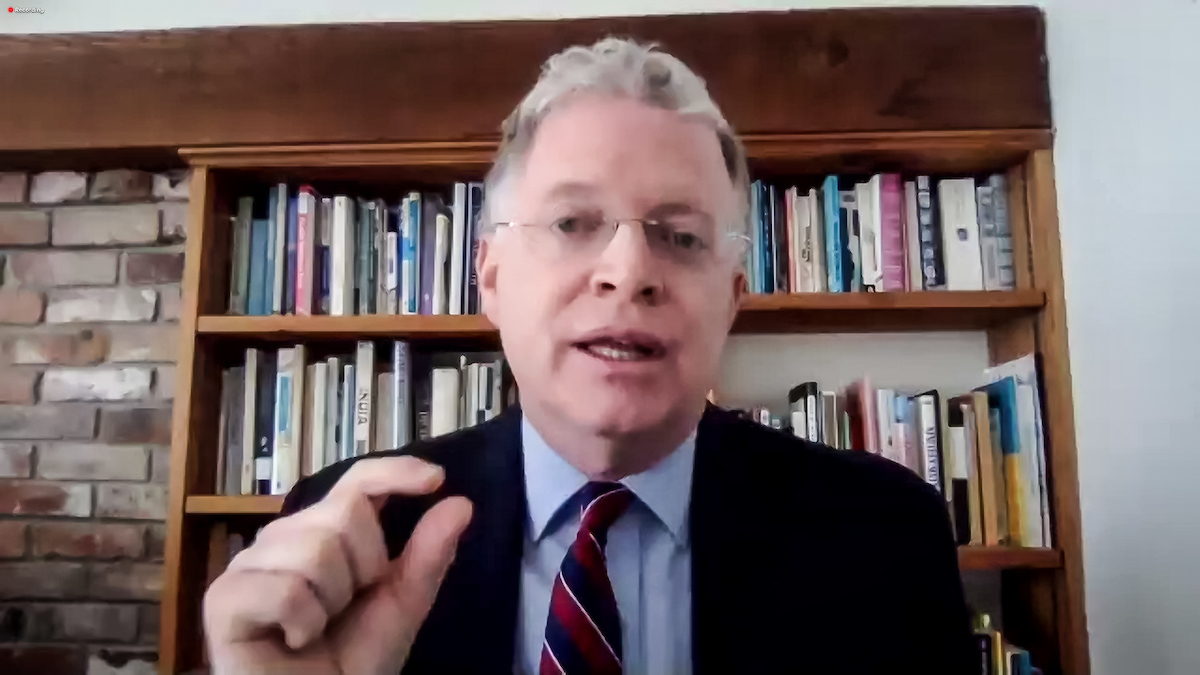President Donald Trump has masterfully used the rhetoric of the "deep state" to divide Congress and the public and to deflect attention away from himself, according to David Rohde, a two-time Pulitzer Prize-winning investigative journalistDavid Rohde is an ASU Future Security Fellow at New America, executive editor for news for NewYorker.com, a global affairs analyst for CNN and a two-time winner of the Pulitzer Prize for international reporting. He is a former reporter for Reuters, the New York Times and the Christian Science Monitor, and he is the author of "Endgame: The Betrayal and Fall of Srebrenica, Europe’s Worst Massacre Since World War II," "Beyond War: Reimagining America’s Role and Ambitions in a New Middle East," and "A Rope and a Prayer: A Kidnapping from Two Sides," written with his wife, Kristen Mulvihill, about their experiences while he was kidnapped in Afghanistan. and current ASU Future Security Fellow at New America.
“I have concluded there is not a ‘deep state’ as Donald Trump defines it, or that there’s a coup,” said Rohde, the author of the new book "In Deep: The FBI, the CIA and the Truth about America's 'Deep State.'"
Rohde recently presented a virtual talk as part of his work this year with ASU’s Center on the Future of War, a partnership between the university and New America, a Washington-based think tank.
“Every president complains about coming to Washington, D.C., and having bureaucrats stifle their goals," he said. "Ronald Reagan said the state department was liberal and wasn’t carrying out his agenda to counter communism. Barack Obama worried that the Pentagon was leaking troop numbers for a possible surge in Afghanistan. But no president has accused career government officials of a coup against them in secret.
“The president’s reaction, choosing to use this term of conspiracy. … It seems exaggeration.”
In his book, Rohde embarks on a sweeping exploration of the CIA and FBI scandals of the past 50 years — from the Church Committee’s exposure of Cold War abuses, to Abscam, to false intelligence about Iraq’s weapons of mass destruction, to National Security Agency mass surveillance revealed by Edward Snowden. It also investigates the claims and counterclaims of the Trump era and the spread of conspiracy theories online and on-air.
“We are deeply honored to work with David Rohde as a fellow this year,” said Daniel Rothenberg, co-director of the Center on the Future of War. “He is a legendary and courageous investigative journalist who writes beautifully and writes with originality and sensitivity about some of the most pressing issues facing our nation and our world.”
Rohde started the lecture by giving a brief history of the 1975 Church Committee, a U.S. Senate select committee that investigated abuses by the CIA, FBI, NSA and the IRS. They discovered the agencies had attempted assassinations on foreign leaders, spied on civil rights leader Martin Luther King Jr. through the orders of J. Edgar Hoover and surveilled the political activities of U.S. citizens, including Supreme Court justices, reporters and government officials.
He said the work of the bipartisan Church Committee was groundbreaking and put several key reforms in place. However, Rohde said, abuses still exist.
“The FBI and the CIA are extremely powerful agencies,” Rohde said. “They’re more powerful than ever in the digital age. More of our personal information can be collected without us realizing it.”
David Rohde, Pulitzer Prize-winning journalist and author of the new book “In Deep: The FBI, the CIA, and the Truth about America’s ‘Deep State,’ ” speaks about the pervasive lack of trust in mainstream media and government during a webinar sponsored by New America on April 22.
Rohde said Americans have grown suspicious of government and pointed to a poll that showed that more than 70% of respondents believe there is or may be a secret group of elected and military officials who are manipulating the system. He added the poll shows that policymakers and the public also deeply mistrust journalists. Rohde credits identity politics for the mistrust.
“Many Republicans and conservatives think that everything is political,” Rohde said. “One Democratic senator told me that he thought about 40% of Republicans in the Senate felt there’s a deep state — an administrative state — that is sort of relentlessly invading peoples’ lives and taking away their rights.”
He said Trump’s impeachment hearings saw a “lionizing” of state departments, diplomats and civil servants, and he placed some of the blame on the media.
“I see a need for commentators, and there’s lots of them these days, but some journalists just need to play it straight and present the facts,” Rohde said. “We need that more than ever.”
The big problem, he said, is that because of identity politics, not everyone can agree on the facts. He said Trump calling the media “fake news” is tipping the balance of power in his favor.
“Trump is an amazing communicator, and people who dismiss him as mentally unbalanced are underestimating him, and I think totally wrong,” Rohde said. “What he’s done is question the legitimacy of Congressional oversight and reduce Congress’ power. He’s also centralizing power by calling media 'fake news' and discrediting us as a source of information. More than any other president, he’s shifting the balance of power … at the same time he’s limited the amount of information about his own activities.”
Rohde said public distrust in government officials has spilled over to the COVID-19 pandemic, questioning the models, stay-at-home orders and health expertise. And it’s hurting us as a nation.
“I’ve read the same news reports as everyone else, and there’s a large number of Americans who don’t trust the government or think the other side is engaged in a plot and it’s all fake,” Rohde said. “I worry that this just gets more intense on both sides. People should fight for the policies they want, but we need a nimble government that is trusted and effective.”
Top photo illustration courtesy of Pixabay
More Law, journalism and politics
Can elections results be counted quickly yet reliably?
Election results that are released as quickly as the public demands but are reliable enough to earn wide acceptance may not always be possible.At least that's what a bipartisan panel of elections…
Spring break trip to Hawaiʻi provides insight into Indigenous law
A group of Arizona State University law students spent a week in Hawaiʻi for spring break. And while they did take in some of the sites, sounds and tastes of the tropical destination, the trip…

LA journalists and officials gather to connect and salute fire coverage
Recognition of Los Angeles-area media coverage of the region’s January wildfires was the primary message as hundreds gathered at ASU California Center Broadway for an annual convening of journalists…



